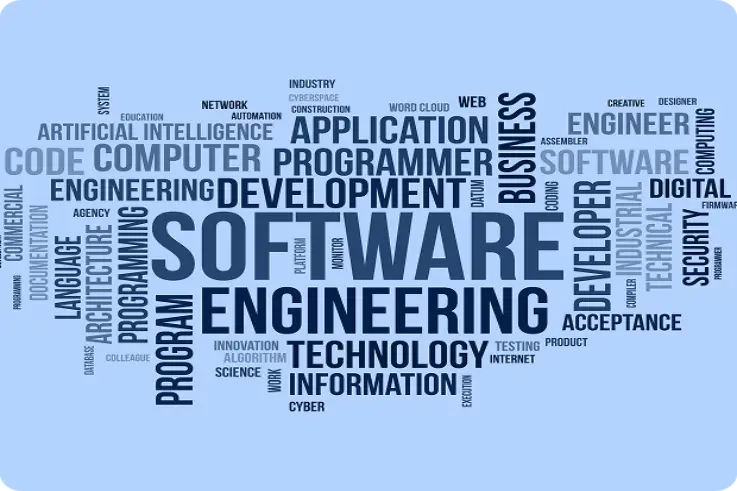1. Software Development Fundamentals
As businesses adopt more digital-first strategies, employees
without prior programming experience can transition into
software development roles through structured training. This
program is designed to equip participants with foundational
coding skills, ensuring they can build applications, manage
databases, and work with modern software development
methodologies.
 Frontend & Backend Development
Frontend & Backend Development
Employees gain hands-on experience with HTML, CSS, JavaScript,
Python, Java, and database management using SQL and NoSQL
solutions. The curriculum covers full-stack development,
enabling trainees to build complete web and mobile applications
 Agile Development & Version Control
Agile Development & Version Control
Understanding Agile methodologies, Scrum frameworks, and Git
version control ensures that new developers can collaborate
effectively within software teams, manage code versions
efficiently, and deliver high-quality software in structured
development cycles.
 Hands-on Projects
Hands-on Projects
Participants work on real-world application development
projects, from simple automation scripts to enterprise-grade web
applications, providing practical coding experience and
preparing them for software development roles in fast-paced
environments.
2. Cloud Computing & DevOps
With the growing reliance on cloud-based infrastructure,
companies need IT professionals who understand cloud services,
automation, and system reliability. This training program
prepares employees to manage cloud deployments, automate IT
operations, and optimize infrastructure.
 Cloud Platforms
Cloud Platforms
Training covers Amazon Web Services (AWS), Microsoft Azure, and
Google Cloud, ensuring engineers can deploy, configure, and
maintain cloud-based applications, enabling businesses to scale
operations efficiently and securely.
 Infrastructure as Code (IaC)
Infrastructure as Code (IaC)
Employees learn to automate deployments using Terraform,
Kubernetes, and Docker, reducing the need for manual
intervention in infrastructure management and increasing
operational agility.
 Continuous Integration & Deployment (CI/CD)
Continuous Integration & Deployment (CI/CD)
Training focuses on optimizing software release cycles, allowing
companies to deploy updates faster while maintaining system
stability, reducing downtime, and ensuring seamless software
delivery.
 Hybrid & Multi-Cloud Management
Hybrid & Multi-Cloud Management
Employees gain expertise in managing workloads across
on-premises and cloud environments, ensuring high availability,
disaster recovery, and cost-efficient resource utilization for
enterprise IT systems.
3. Cybersecurity & IT Risk Management
With cyber threats increasing globally, businesses must equip
employees with the skills to identify, prevent, and mitigate
cyber risks. This program ensures that organizations maintain
robust security measures, data protection policies, and
compliance with industry regulations.
 Cyber Threat Detection & Mitigation
Cyber Threat Detection & Mitigation
Employees learn ethical hacking, penetration testing, malware
analysis, and security incident detection to safeguard company
assets, minimize security vulnerabilities, and proactively
protect enterprise systems.
 Security Frameworks & Compliance
Security Frameworks & Compliance
The curriculum covers ISO 27001, GDPR, Nigeria Data Protection
Regulation (NDPR), and NIST cybersecurity standards, ensuring
businesses comply with global and local security policies to
avoid legal and reputational risks.
 Incident Response & Recovery
Incident Response & Recovery
Employees gain experience using machine learning models,
artificial intelligence (AI), and automation tools to forecast
trends, detect anomalies, and enhance business performance,
improving decision-making and competitive advantage.
 Network Security & Access Control
Network Security & Access Control
Practical exercises teach staff how to secure enterprise
networks, set up firewalls, and implement access controls,
minimizing unauthorized access and protecting sensitive business
data from potential breaches.
4. Business Intelligence & Data Analytics
In the digital era, data-driven decision-making is crucial for
business success. This program reskills employees to handle data
analysis, reporting, and business intelligence tools, empowering
organizations to make informed, strategic decisions.
 Data Visualization & Reporting
Data Visualization & Reporting
Employees learn to work with Excel, Power BI, and Tableau,
creating dashboards and automated reports that provide
actionable business insights, making data more accessible and
impactful for strategic planning.
 SQL & Database Management
SQL & Database Management
The program covers query optimization, database structuring, and
real-time data processing, ensuring employees can efficiently
manage business data, enhance reporting accuracy, and streamline
business intelligence workflows.
 Predictive Analytics & AI Integration
Predictive Analytics & AI Integration
Employees gain experience using machine learning models,
artificial intelligence (AI), and automation tools to forecast
trends, detect anomalies, and enhance business performance,
improving decision-making and competitive advantage.
 Network Security & Access Control
Network Security & Access Control
Practical exercises teach staff how to secure enterprise
networks, set up firewalls, and implement access controls,
minimizing unauthorized access and protecting sensitive business
data from potential breaches.
 Big Data & Cloud Data Management
Big Data & Cloud Data Management
Training includes working with Google BigQuery, AWS Redshift,
and Microsoft Azure Data Lake, helping businesses manage
large-scale datasets efficiently, enabling scalability, and
optimizing real-time data processing for analytics-driven
enterprises.
5. IT Support & Helpdesk Operations
For organizations looking to improve internal IT support, this
training equips employees with the skills to troubleshoot
hardware, software, and network-related issues. Employees
trained in this program can reduce system downtime, improve
customer support, and enhance IT service management.
 Hardware & Software Troubleshooting
Hardware & Software Troubleshooting
Employees learn to work with Excel, Power BI, and Tableau,
creating dashboards and automated reports that provide
actionable business insights, making data more accessible and
impactful for strategic planning.
 IT Service Management (ITSM)
IT Service Management (ITSM)
The program introduces industry best practices for IT service
management, ticketing systems, and end-user support, ensuring
smooth IT operations, reducing helpdesk response times, and
improving customer satisfaction.
 Network Security & Access Control
Network Security & Access Control
Practical exercises teach staff how to secure enterprise
networks, set up firewalls, and implement access controls,
minimizing unauthorized access and protecting sensitive business
data from potential breaches.
 Helpdesk Automation & AI Integration
Helpdesk Automation & AI Integration
Employees gain experience using chatbots and AI-driven IT
support systems, reducing the burden on IT teams and improving
customer satisfaction through automated responses, faster issue
resolution, and proactive system monitoring.








